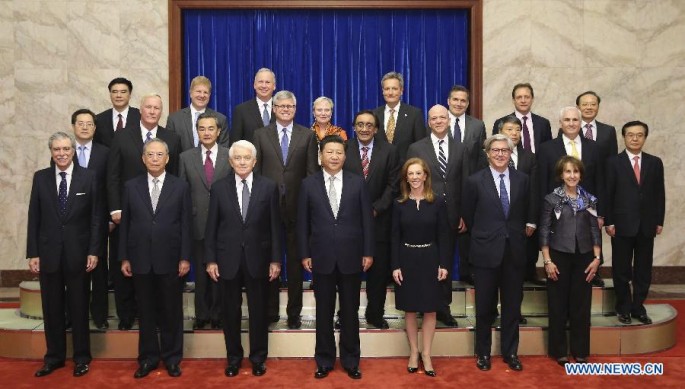CEOs of China’s top 15 companies are traveling with President Xi Jinping during his first state visit to the United States this week, in a bid to showcase the country’s improved commercial and industrial capacities.
The business delegation accompanying Xi, which includes Jack Ma of Alibaba Group, Ma Huateng of Tencent Holdings, Yang Yuanqing of Lenovo Group, and Li Yanhong of Baidu Inc., will meet with executives of top U.S. companies in Seattle on Wednesday, according to Chicago-based Paulson Institute.
"The executives in the group were chosen either based on their U.S. links or those whose companies will soon launch new projects with partners in the U.S.," He Weiwen, an executive council member of the China Society for WTO Studies, said in an interview with the Global Times on Monday.
According to He, many deals are expected to be signed during Xi's visit, including plans for Boeing to set up plants in China and Sino-U.S. cooperation on commercializing the fourth generation of nuclear power plant technology.
Some of the projects were announced prior to Xi's visit. In August, the Wanxiang Group, one of the 15 firms in the delegation, agreed to invest $10 million in Shanghai-based InnoSpring, which owns the first U.S.-China incubator technology platform in Silicon Valley. Wanxiang is also currently an investor in more than 60 real-estate projects in the U.S.
Analysts also noted that most of the members of the business delegation were from private firms, with Alibaba, Tencent and Baidu being included for the first time.
"Xi's visit to Seattle brings together the three tech giants. While the U.S. remains a leader in IT, China is a rising star," said Xu Hongcai, an expert at the China Center for International Economic Exchanges.
Xu added that the listing of Chinese tech firms in the U.S., especially that of Alibaba, has also strengthened the bond between the Chinese and U.S. markets.
"Although China's technology is not as advanced as that of the U.S., China is quite good at marketing technologies, which is what U.S. firms need," said Wang Yiwei, director of the Institute of International Affairs at the Renmin University of China.
Xi's state visit comes at a time when the Chinese economy is shifting from government spending and manufacturing to consumption. After decades of double-digit growth, China's economy recorded its slowest growth rate in nearly a quarter of a century, following the country's readjustment of its 2014 economic growth figure to 7.3 percent in September.
"In the past, Chinese companies tried hard to expand in the U.S. market through lower prices, but many emerging domestic companies have an edge on their U.S. counterparts, especially in infrastructure, railways and power grids," said Wang.



























